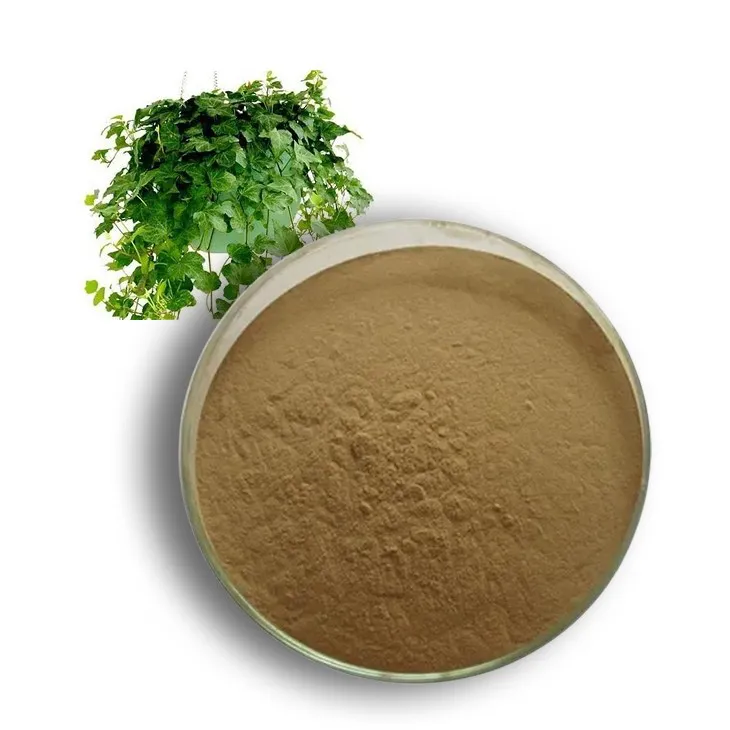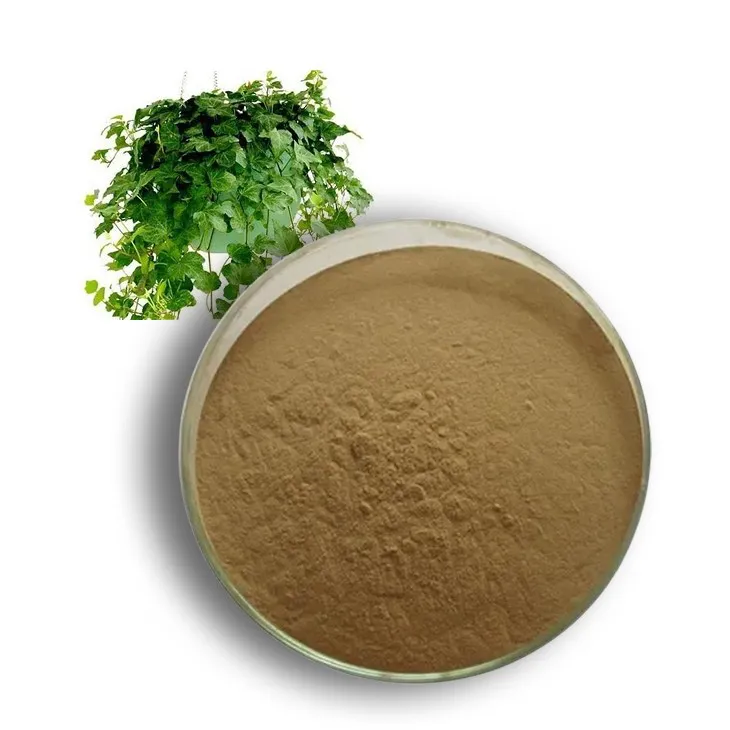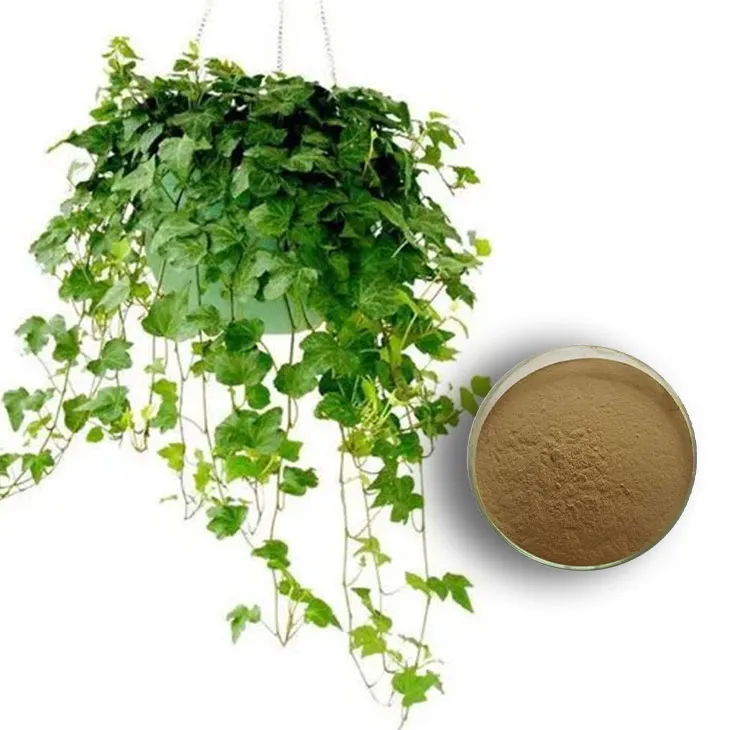- 0086-571-85302990
- sales@greenskybio.com
Ivy Extract Suppliers.
2024-12-01

Introduction
Ivy Extract has emerged as a highly sought - after natural product in numerous industries. Its diverse range of potential applications, from pharmaceuticals to cosmetics and dietary supplements, has led to an increased demand for reliable suppliers. This article will explore the key factors to consider when looking for an Ivy Extract supplier.

Quality Control
1. Source of Ivy Plants
Reputable suppliers place great emphasis on the origin of the ivy plants from which the extract is obtained. The quality of the raw material directly impacts the final product. High - quality ivy plants should be grown in optimal conditions, free from contaminants such as pesticides, heavy metals, and harmful microorganisms. Suppliers need to have a strict screening process for the incoming ivy plants. For example, they may collaborate with trusted growers who follow good agricultural practices (GAP). These growers ensure that the plants are cultivated in clean soil, with proper irrigation and fertilization methods, which helps to maintain the health and purity of the ivy plants.
2. Purification Processes
Once the ivy plants are sourced, the extraction process is followed by purification. This is a crucial step in ensuring the purity and potency of the Ivy Extract. Different purification techniques can be employed, such as filtration, chromatography, and distillation.
- Filtration helps to remove solid particles, debris, and larger impurities from the extract. Suppliers may use various types of filters, such as membrane filters or filter papers, depending on the nature of the extract and the desired level of purity.
- Chromatography is a more advanced technique that can separate different components of the extract based on their chemical properties. High - performance liquid chromatography (HPLC) is often used in the purification of ivy extract. It allows for the isolation and identification of specific active compounds, ensuring that the final product contains the desired components in the right proportions.
- Distillation can be used to separate volatile components from the non - volatile ones. This process is useful for removing solvents or other volatile impurities from the ivy extract.
Quality control laboratories play an important role in monitoring the purification processes. They conduct regular tests to check the purity, potency, and stability of the ivy extract. These tests may include chemical analysis, such as determining the concentration of active compounds, as well as microbiological testing to ensure the absence of harmful bacteria, fungi, and viruses.

Extraction Process Experience
1. Knowledge of Different Extraction Methods
An experienced ivy extract supplier should be well - informed about various extraction methods. Two commonly used methods are solvent extraction and supercritical fluid extraction.
Solvent extraction involves the use of a solvent, such as ethanol or methanol, to dissolve the active compounds from the ivy plants. The choice of solvent depends on the solubility of the target compounds and the compatibility with the subsequent processing steps. However, solvent extraction may have some drawbacks, such as the potential for solvent residues in the final product and the need for careful solvent removal to ensure safety and quality.
Supercritical fluid extraction, on the other hand, uses a supercritical fluid, typically carbon dioxide (CO₂), as the extraction medium. Supercritical CO₂ has unique properties that make it an attractive option for ivy extract extraction. It has a high diffusivity, which allows it to penetrate the plant material quickly and efficiently, and it can be easily removed from the extract without leaving any residues. Suppliers with expertise in supercritical fluid extraction can optimize the process parameters, such as pressure, temperature, and flow rate, to obtain a high - quality ivy extract with maximum yield of active compounds.
2. Selection of the Most Appropriate Method
The ability to choose the most appropriate extraction method is a sign of a competent supplier. They need to consider several factors when making this decision.
- Nature of the Active Compounds: Some active compounds may be more soluble in certain solvents or more easily extracted using a particular method. For example, if the target compound is heat - sensitive, supercritical fluid extraction may be a better choice as it can be carried out at relatively low temperatures compared to solvent extraction.
- Desired Purity and Potency: Different extraction methods can result in different levels of purity and potency of the extract. If a high - purity extract with a specific concentration of active compounds is required, a more selective extraction method, such as chromatography - based extraction, may be necessary.
- Cost - effectiveness: The cost of the extraction process also plays a role. Solvent extraction may be more cost - effective in some cases, especially for large - scale production, but the cost of solvent removal and quality control should also be considered. Supercritical fluid extraction equipment can be expensive, but it may offer advantages in terms of product quality and reduced waste.

Ethical and Sustainable Sourcing
1. Sustainable Harvesting Practices
Suppliers who are committed to ethical and sustainable sourcing understand the importance of protecting the environment. Ivy plants are natural resources, and over - harvesting can lead to depletion of these resources. Sustainable harvesting practices involve measures such as:
- Harvesting only a certain percentage of the ivy plants in a given area to allow for regeneration. For example, suppliers may follow guidelines that limit the harvest to a maximum of 30% of the available ivy plants in a particular location in a single season.
- Monitoring the health of the ivy populations over time. This can be done through regular surveys and ecological studies to ensure that the harvesting activities are not causing long - term damage to the ecosystem. Suppliers may work with environmental experts or conservation organizations to conduct these monitoring activities.
- Promoting the growth of ivy plants through appropriate management techniques. This can include activities such as providing suitable growing conditions, such as proper sunlight, water, and soil nutrients, and controlling pests and diseases in a natural and sustainable way.
2. Fair Trade and Certifications
In addition to sustainable harvesting, ethical suppliers also adhere to fair trade principles. This means that they ensure that the growers and collectors of the ivy plants are fairly compensated for their work. Fair trade practices can have a positive impact on the livelihoods of local communities involved in the ivy supply chain.
Furthermore, suppliers should have proper certifications related to sustainable sourcing. Some well - known certifications in the natural products industry include:
- Forest Stewardship Council (FSC) certification, which focuses on sustainable forest management. Although ivy plants may not always be part of a forest ecosystem, the principles of sustainable management can be applied to their cultivation and harvesting.
- Rainforest Alliance certification, which promotes sustainable agriculture and forestry practices in tropical regions. If the ivy plants are sourced from tropical areas, this certification can be an important indicator of ethical and sustainable sourcing.
- Organic certifications, which ensure that the ivy plants are grown without the use of synthetic pesticides, fertilizers, and genetically modified organisms (GMOs). Organic - sourced ivy extract may be preferred for certain applications, especially in the production of natural and organic cosmetics and dietary supplements.
- Title: Sustainable Sourcing of Botanical Extracts: A Review"
- Title: "Quality Control in the Production of Herbal Extracts"
- Title: "The Role of Extraction Experience in Producing High - Quality Botanical Extracts"
Conclusion
When searching for an ivy extract supplier, it is essential to consider quality control, extraction process experience, and ethical and sustainable sourcing. By carefully evaluating these factors, businesses and consumers can ensure that they are obtaining a high - quality ivy extract from a reliable and responsible supplier. The demand for ivy extract is likely to continue to grow in the future, and suppliers who meet these criteria will be well - positioned to meet the market's needs while also contributing to the long - term viability of the ivy plant resources and the well - being of the communities involved in its production.
FAQ:
Question 1: How can one verify the quality of ivy extract from a supplier?
One can verify the quality of ivy extract from a supplier in several ways. Firstly, check if the supplier provides detailed information about the source of the ivy plants. High - quality suppliers source from reliable and healthy ivy plants. Secondly, look for certificates related to quality control, such as Good Manufacturing Practice (GMP) certificates if applicable. Thirdly, ask for data on the purity and potency of the extract. Reputable suppliers should be able to provide test results from independent laboratories.
Question 2: What are the benefits of choosing a supplier with extensive extraction experience?
A supplier with extensive extraction experience offers several benefits. They are more likely to produce a high - quality ivy extract. Experienced suppliers know how to handle different extraction methods efficiently. For example, they can choose the best solvent or supercritical fluid extraction technique to maximize the yield of active compounds. They also have better knowledge of potential problems during the extraction process and how to solve them, which helps in maintaining the consistency and quality of the extract.
Question 3: How can a supplier ensure ethical and sustainable sourcing of ivy?
Suppliers can ensure ethical and sustainable sourcing of ivy in multiple ways. They can work with local communities to ensure fair trade, which means paying a fair price to the collectors of ivy. For sustainable harvesting, they should follow guidelines that limit the amount of ivy harvested to prevent over - exploitation. They can also invest in ivy cultivation projects to reduce the pressure on wild ivy resources. Additionally, having certifications like Forest Stewardship Council (FSC) related to sustainable sourcing is a good indication.
Question 4: Are there any regulations that ivy extract suppliers need to follow?
Yes, there are regulations that ivy extract suppliers need to follow. In the pharmaceutical industry, suppliers need to comply with drug regulatory authorities' requirements, which include strict quality control and safety standards. For cosmetics, they must follow cosmetic regulations regarding ingredient safety and labeling. In the case of dietary supplements, there are also specific regulations about the purity, potency, and proper labeling of the products containing ivy extract.
Question 5: How can one find a reliable ivy extract supplier?
To find a reliable ivy extract supplier, start by researching online. Look for suppliers with positive reviews and a good reputation in the industry. Check their websites for information about their sourcing, extraction processes, and quality control measures. Attend trade shows related to natural products or the specific industries (pharmaceuticals, cosmetics, etc.) where ivy extract is used. Here, you can meet suppliers in person, ask questions, and evaluate their products. You can also ask for referrals from other companies or professionals in the field.
Related literature
- ▶ Hesperidin
- ▶ Citrus Bioflavonoids
- ▶ Plant Extract
- ▶ lycopene
- ▶ Diosmin
- ▶ Grape seed extract
- ▶ Sea buckthorn Juice Powder
- ▶ Fruit Juice Powder
- ▶ Hops Extract
- ▶ Artichoke Extract
- ▶ Mushroom extract
- ▶ Astaxanthin
- ▶ Green Tea Extract
- ▶ Curcumin
- ▶ Horse Chestnut Extract
- ▶ Other Product
- ▶ Boswellia Serrata Extract
- ▶ Resveratrol
- ▶ Marigold Extract
- ▶ Grape Leaf Extract
- ▶ New Product
- ▶ Aminolevulinic acid
- ▶ Cranberry Extract
- ▶ Red Yeast Rice
- ▶ Red Wine Extract
-
Dan Shen Root Extract/Salvia Root Extract
2024-12-01
-
Hesperidin
2024-12-01
-
Stevia Extract
2024-12-01
-
Buckthorn bark extract
2024-12-01
-
Red Date Extract
2024-12-01
-
Citrus Aurantium Extract
2024-12-01
-
Angelica sinensis extract
2024-12-01
-
Cactus Extract
2024-12-01
-
Cat Claw Extract
2024-12-01
-
Baicalin
2024-12-01





















